Is Classical Chess Dead?
The future of classical chess has been discussed for decades, and the topic has come up once again. The question has been how to make it more marketable for wider public appeal and to eliminate the dreaded “draw death.” Quickplay via online platforms has exploded. Will classical chess be phased out? After the 2022 World Rapid & Blitz in Altamy, Kazakhstan ended with outstanding performances by Magnus Carlsen, we can reflect on his earlier statements that most of the top-level tournaments will be held online.
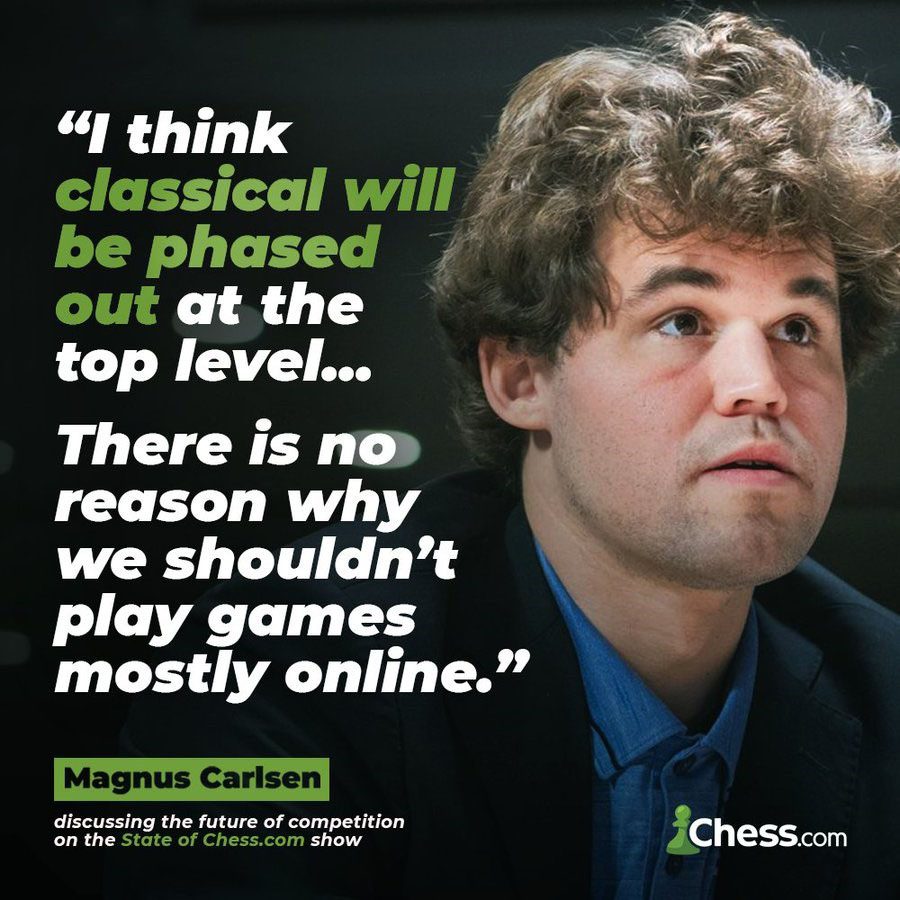
Online vs. OTB
Objectively, there is still a lot of value in staging top-level events in major venues worldwide. It offers a visual, global platform for the marketing of chess and the imagery is much more enduring. Would there be tremendous brand erosion if the Tata Steel or Sinquefield Cup were held online instead of over-the-board (OTB) in Wijk aan Zee and the St. Louis Chess Club, respectively? Absolutely, but most would agree that a nice balance between marquee events and online events is possible.
Missing from online events would be the social-psychological elements in sports such as the physical proximity, the body language, the playing environment, the fans’ interaction with players, the onsite interviews, and the photography. Imagine if the Rapid & Blitz tournament had been held on an online server. Besides the time zones and variable quality of internet connections, watching two players represented as boxes on a two-dimensional screen is not as visually appealing as seeing players together in beautifully-staged playing halls. Of course, this is strictly from a spectating standpoint.
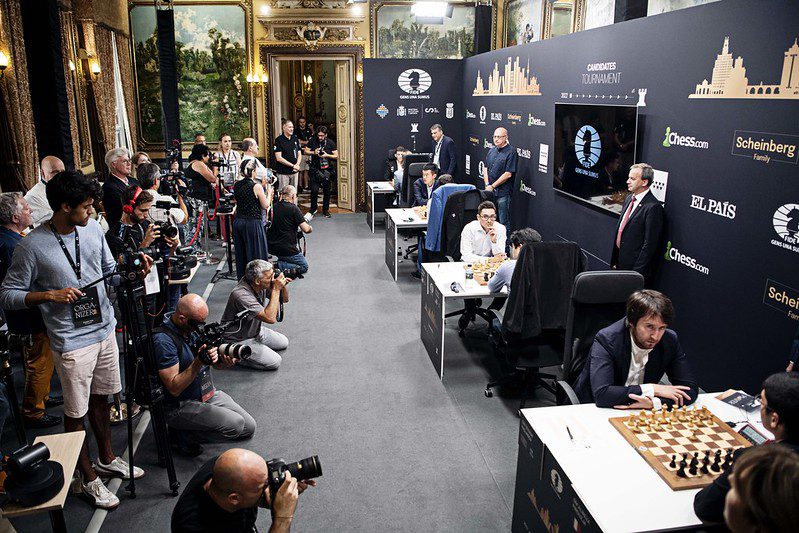
Photos by FIDE/Stev Bonhage
Of course, there is quite a difference!
Admittedly, online play negates the need to buy expensive plane tickets, jet lag, and the overall hassles of adjusting to a different environment. The pandemic period gave rise to an array of high-level tournaments, and online activity exploded. There was a lot of discussion on whether online chess would take over. The reality is players were glad to play in person after two years of online events. We did everything online… work, play, shop, and communicate. There was a sense of online fatigue because human interaction was restricted.
Essentially both worlds have become complementary and not mutually exclusive. It is the same in many industries, including my field of higher education. Few 18-year-olds would choose an online degree over being on a beautiful campus, but the key is finding the right balance between physical and virtual realms and providing options.
Where is Chess Going?
Sagar Shah of ChessBase India posted an article titled “Where is Chess Going?” He contends that rising stars must decide where to put their energy (classical vs. quickplay) if they want to compete at the highest level. We know that almost every top-level player has it in their mind to become World Champion through classical chess. Thus, they may differ in how they assess its importance. That being said, the young stars of today seem to be well-rounded in all formats.
Although Carlsen has thrice won the “Triple Crown” (holding championships in classical, rapid, and blitz), he has been on record stating his lack of motivation to defend his classical title. Months after defending it successfully against Ian Nepomniachtchi, he announced that he would not defend unless someone from the younger generation were the challenger. He specifically singled out Iranian-French phenom Alireza Firoujza and added…
“I am not motivated to play another match. I simply feel that I don’t have a lot to gain, I don’t particularly like it, and although I’m sure a match would be interesting for historical reasons and all of that, I don’t have any inclination to play and I will simply not play the match.”
~Carlsen during a 2021 podcast
Carlsen had also expressed his preference for knockout formats. The above pronouncements say four things. Firstly, he does not prefer the classical format over quickplay; second, he does not prefer over-the-board play over online; third, he does not prefer the match format over tournaments; lastly, he seeks new competition from today’s rising talents. His comments have generated some discussion, but there was no conclusive view.
Carlsen’s ideas seem like speculative thoughts rather than a well-crafted ideology. The question is, how do we find the right formula for determining the World Champion? Maybe it’s a combination. At the World Championship in Dubai, I asked this question…
Video by FIDE Chess
Blitz vs. Classical
While blitz is a very sociable and fun activity, we have to grow into playing faster as our skills improve. Perhaps quickplay attracts those who enjoy the action of players moving at a frenetic pace but to think that classical chess is boring because the players are not moving every minute is very simplistic. Classical and blitz are as different as the 100-meter sprint is different from the 1500-meter run. Both have their aesthetic appeal and excitement, but it is a matter of taste.
To some, blitz is more exciting; to others, it makes chess more like consuming fast food. Although it is quick and enjoyable, perhaps it is not the best quality. It is often used as a training tool or to enjoy social interaction. On the other hand, classical chess is more like a home-cooked meal with preparation over hours. Seeing a wonderful classical game unfold at the highest level may mean the game ends in a draw, but a wealth of ideas can be immortalized in books and studied for years to come.
The idea of whether we will move to faster time control has been vigorously debated for the past 15-20 years with the rise of engines. There is no question that quickplay is more popular than ever and accessible through online servers. Trying to find a way to make chess more exciting (and thus, more marketable) has spurred new methods such as incentivizing wins, banning draw offers, speeding up play, and increasing the presence of variants such as Fischer Random or “Chess 960.” The struggle continues.
Fighting Against “Draw Death”
Nearly 100% of people who learn chess, learn the classical way… over-the-board, with no clock and face-to-face. What attracted us to chess in the first place? For most, it wasn’t the speed of play. Perhaps some were attracted by seeing two players playing a random game. This was what attracted me. Others may have been inspired by a particular player (i.e., “Fischer Boom”), while the intellectual challenge attracted others. In general, it is this slow build-up that makes classical chess one of intrigue.
While all tournament players can attest that blunders happen in classical play, the precision of chess engines makes them less likely. You end up with perfectly-played games, and thus, the dreaded “draw death” of chess. Opening preparation often goes into move 30. One of Bobby Fischer’s complaints was that “prearrangement” or home preparation is ruining chess. Only weeks ago, Arjun Erigaisi won a nice rapid game. The win wasn’t the only impressive thing. Afterward, it confirmed that he had followed his home preparation for 30+ moves. The game was pure beauty.
Video by Sagar Shah/ChessBase India
Despite the role of opening preparation, chess continues to amaze us. While some variations have been analyzed almost to mate, obscure lines are revived. Some have even had opening theme tournaments where you start with a certain middlegame position and bypass the opening altogether. Chess 960 seems to neutralize decades of preparation in the one position we have been playing for centuries, #518. If we adopt 960 as a staple in chess play, we could not possibly exhaust exciting possibilities. We saw the amazing ideas in the recent Fischer Random Championship, although some of the positions were disorienting.
2022 Rapid & Blitz Championships (Altamy, Kazakhstan)
Some “traditionalists” feel that the sanctity of chess is characterized by elaborate planning and execution unfolding over a set amount of time. Quickplay is characterized by pattern recognition, quick reflexes, intuition, and a bit of opportunism. For example, the recent Rapid & Blitz event gave us five days worth of thrills. However, the rash of blunders seen during the Rapid & Blitz would rarely happen in classical play. There were lost pieces, poorly managed time, a missed mate in one (!), many squandered winning positions, and even some gross oversights.
Some of the oversights were stunning, like the 18-move win by Russia’s Daniil Dubov.
Ouch! Nihal Sarin blunders into the mating tactic 18.Qh5! and 2018 World Rapid Champion Daniil Dubov is moving up the standings: https://t.co/bKQpEKjNoN #c24live #RapidBlitz pic.twitter.com/8aMeBGilwN
— chess24.com (@chess24com) December 27, 2022
It is improbable that India’s Nihal Sarin would miss the 18.Qh5 shot in a classical game. It is also likely that if this were a puzzle, the average player would see the winning move in seconds. Quickplay adds stress to the thought process due to having less time to make critical decisions. Thus, blitz is not always about playing the best moves but about playing optimal moves given the time situation. Sometimes even beautiful wins are missed.
Hans Niemann, a central figure in a global controversy, seemed to be under the microscope in the Rapid & Blitz, and was the subject of fierce and relentless trolling. During the tournament, he missed several opportunities, including one in the rapid segment that would have earned him praise.
If the position is correct, Niemann missed mate in three against Maghsoodloo. 46.Be4+! snares the king. pic.twitter.com/BhgXxZnJQ5
— Daaim Shabazz (@thechessdrum) December 27, 2022
Because of the fast pace and adrenaline rush, blitz can also lead to emotional outbursts and arguments. Thirteen-year-old Russian FM Nikolaj Averin was embroiled in at least a couple of disputes (with GMs Ahmed Adly and Ehsan Ghaem Maghami) and a demoralizing loss on time to Srinath Narayanan after declining a draw offer. There was also the Uzbekistan phenom, 12-year-old FM Khumoyun Begmuratov, who pulled off a nice swindle.
Video by Sagar Shah/ChessBase India
Intense!
There were other games that featured spectacular play, as Carlsen played a thrilling game with Richard Rapport featuring three queen promotions! Rapport missed several wins under time pressure. While the game had many mistakes, it may be one of the most exciting blitz games you’ve ever seen!
Magnus Carlsen shares his sheer joy with Daniil Dubov after pulling off an incredible win from a lost position against Richard Rapport! https://t.co/m0LcucN8Tv #c24live #RapidBlitz pic.twitter.com/t3Nipaq2FL
— chess24.com (@chess24com) December 30, 2022
Insane Blitz Game (Carlsen-Rapport)
Analysis by Jan Gustafsson/Chess24
In the Final Analysis…
It is the view of this writer that chess should not come down to an “either/or” decision. The online/OTB, classical/quickplay, and match/tournament debates are all relevant to the promotion of chess. It will require some deep analysis of empirical data. Perhaps there will be an increase in online events, but it doesn’t have to come at the expense of staging most of the high-level classical events. You can still keep a balance between traditional and new-age.
Sitting where Carlsen is, he has seen everything and has accomplished just about everything in chess. He seems to have decided that OTB classical is not where he would like to focus his energy. His notion of a format change for the world championship has been discussed many times. However, it is doubtful that the world championship will be determined in the knockout format he suggested years ago. It may very well be that the world championship title will combine various formats of chess (classical, rapid, blitz, and 960). This would be my suggestion.
The good thing about all of this is that we have a good crop of global talent rising. They have already sent the message that they are a force to be reckoned with in all formats. It appears regardless of the format or the playing venue, chess players will have to be ready to fight. It is my belief that classical chess will stand the test of time and that Fischer Random will become the future. You can continue the ultrabullet games in position #518, but how about doing that in position #374?

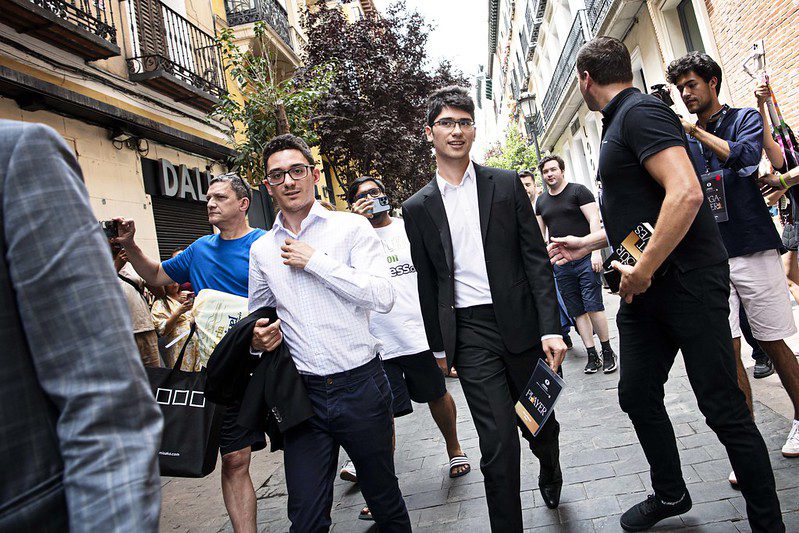

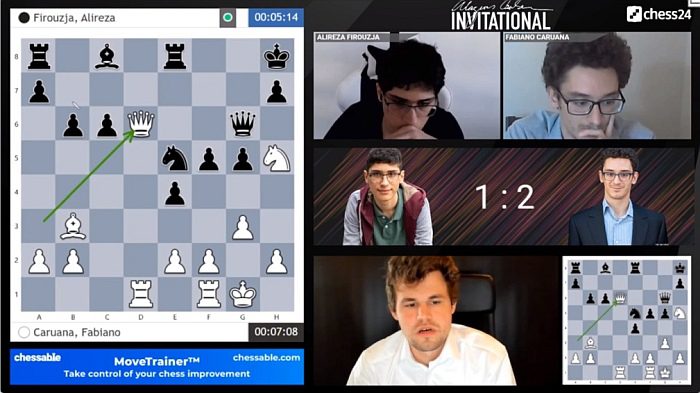
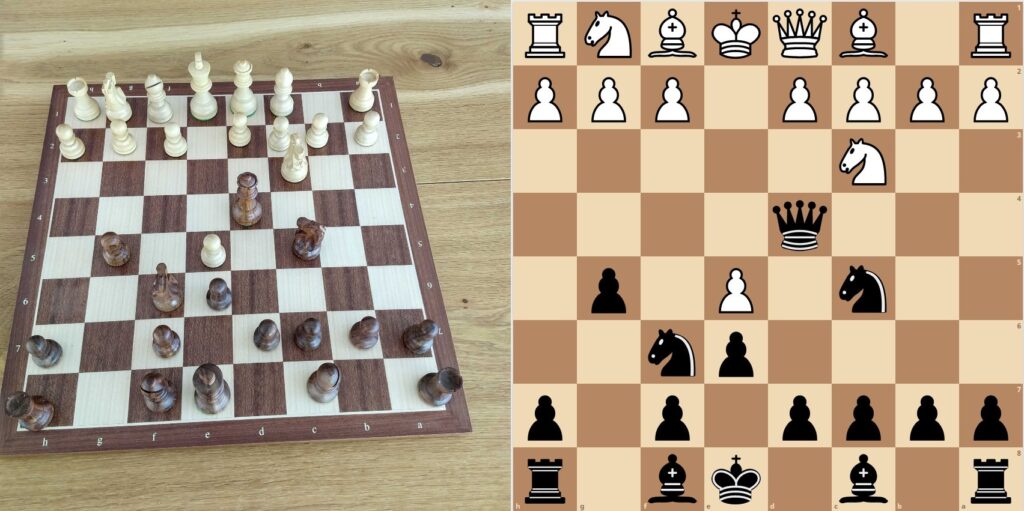
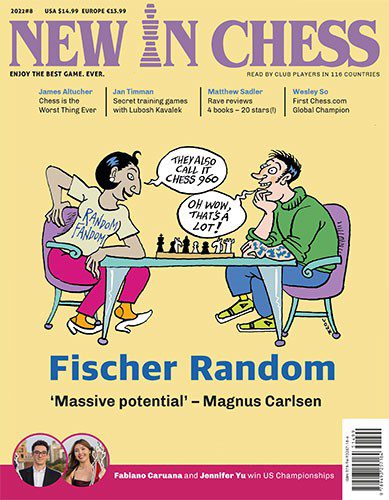
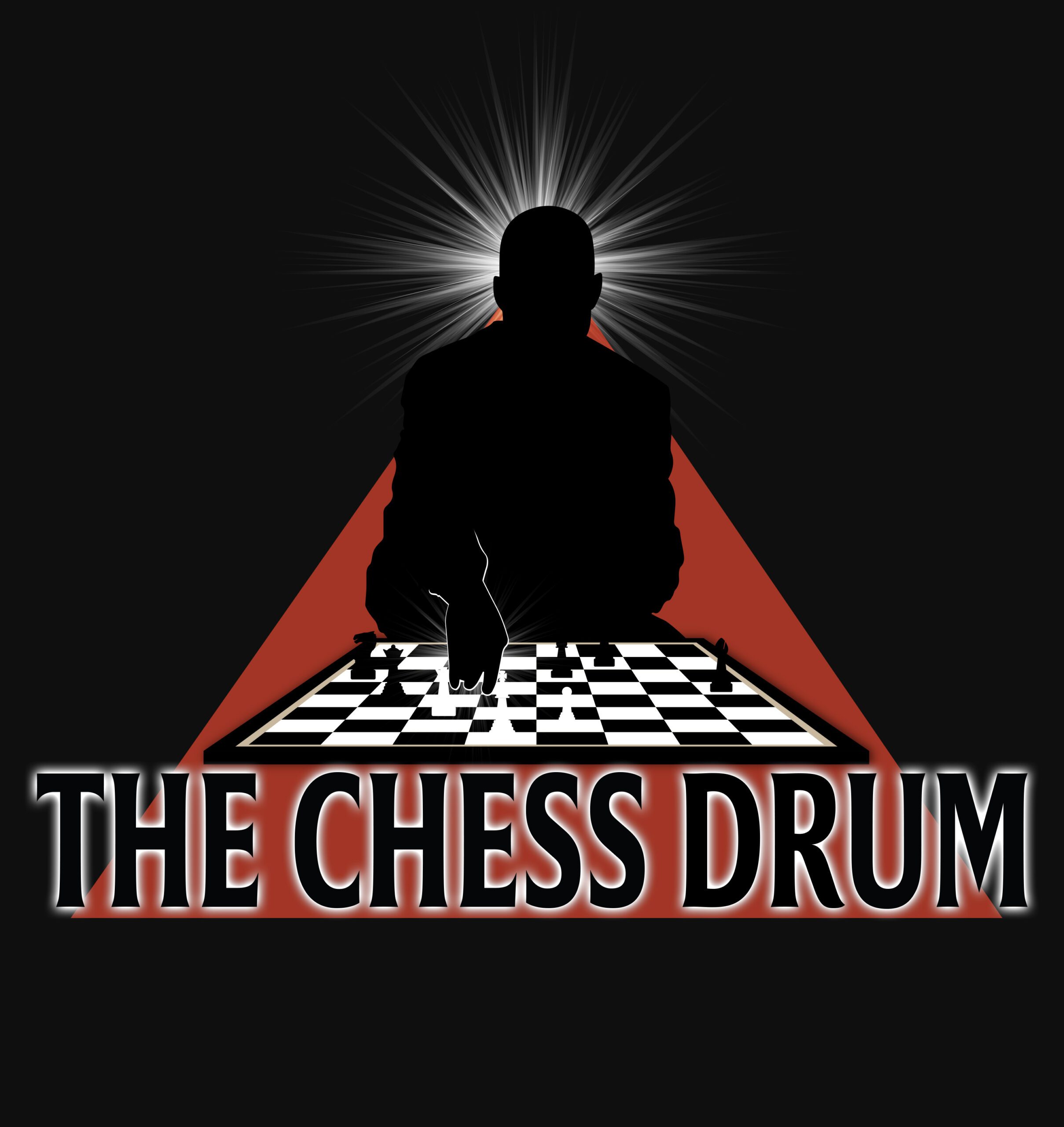
Why travel all the way to Kazakhstan to play in the World Rapid & Blitz when you can have the tournament online? This video is why. GMs Aman Hambleton and Eric Hansen put out a video of their travel from Canada to Astana to Almaty (Kazakhstan). If nothing else, it shows the joy of travel and the anticipation of the upcoming event. Nice travelog! With an online tournament, none of these stories are possible.
ChessBrahs head to World Rapid & Blitz
Video by ChessBrah
In the latest New in Chess, Carlsen talks about the massive potential of Fischer Random, but also believes that “regular” chess should be played faster. In contrast, “Fischer Random” should be played at classical levels. Obviously… after five centuries of developing opening theory in position #518, it would make sense to suggest that could be played quicker because we have compiled so much data on the one starting position. Not so much on position #214 (NQBRKBNR) or #876 (QBRKRNBN).